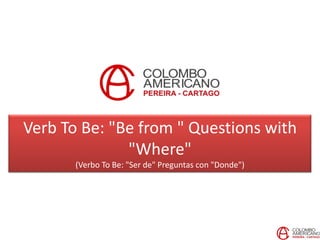
Course 1-Unit 2: Verb to be. questions with where from.
- 1. Verb To Be: "Be from " Questions with "Where" (Verbo To Be: "Ser de" Preguntas con "Donde")
- 2. Verb To Be: Questions with “Be from” Remember the conjugation of the verb “To Be” Personal Pronoun Verb To Be in Present I am He Is She It You We are They
- 3. El Verbo "Be from" El verbo "Be from" significa en español "Ser de" Juanes es de Medellin He is from Medellin Affirmative Statements (Oraciones Afirmativas) El es Juanes. El es de Medellin. He is Juanes. He is from Medellin.
- 4. El Verbo "Be from" El verbo "Be from" significa en español "Ser de" Él no es de Bogota He is not from Bogota Negative Statements (Oraciones Negativas) Él no es Arjona. He is not Arjona. Mismo verbo, dos significados
- 5. El Verbo "Be from" El verbo "Be from" significa en español "Ser de" Affirmative Negative Statements Statements (Oraciones Afirmativas) (Oraciones Negativas) I am from Pereira. I’m not from Cali. (Yo soy de Pereira) (Yo no soy de Cali) You’re from Bogotá. You are not from Pasto. (Tú no eres / Usted no es de Pasto) (Tú eres /Usted es de Bogotá) He’s from Ecuador. He’s not from Chile. (Él es de Ecuador) (Él no es de Chile) She is from Miami. She is not from Tampa. (Ella es de Miami) (Ella no es de Tampa) They’re from France. They’re not from Perú. (Ellos no son de Perú) (Ellos son de Francia) We are from Colombia. We’re not from Italy. (Nosotros somos de Colombia) (Nosotros no somos de Italy)
- 6. El Verbo "Be from" El verbo "Be from" significa en español "Ser de" Yes / No Questions (Preguntas con respuesta Si o No) Questions: Yes, I am. (Respuesta afirmativa) Are You from Bogotá? (Eres tu/ Es usted de Bogotá?) No, I am not. (Respuesta negativo) Is Shakira from Ecuador? No, She is not. (Es Shakira de Ecuador?) Is Madona from U.S.A? Yes, She is. (Es Madona de U.S.A?) Are Vicente y Alejandro Fernandez from Mexico? (Son Vicente y Alejandro Fernandez de Mexico?) Yes, They are.
- 7. El Verbo "Be from" El verbo "Be from" significa en español "Ser de" Where “Be from” Questions. (Preguntas de información. De donde?) Questions: Where are you from? I am from Pereira. (De donde eres tu? o De donde es usted?) (Yo soy de Pereira.) Where is Alvaro Uribe from? (De donde es Alvaro Uribe?) He is from Medellin. (Él es de Medellin.) Where are Vicente y Alejandro Fernandez from? (De donde son Vicente y Alejandro Fernandez?) They are from Mexico. (Ellos son de Mexico) Where is Sofia Vergara from? (De donde es Sofia Vergara?) She is from Barranquilla. (Ella es de Barranquilla)
- 8. El Verbo "Be from" El verbo "Be from" significa en español "Ser de" Where “Be from” Questions. (Preguntas de información. De donde?) Questions: Recuerde que “Where” se puede contraer con el Verbo To be “is” solamente: “Where is = Where’s” “Where’re” X Where’s Alvaro Uribe from? (De donde es Alvaro Uribe?) He’s from Medellin. (Él es de Medellin.) Where are Vicente y Alejandro Fernandez from? (De donde son Vicente y Alejandro Fernandez?) They’re from Mexico. (Ellos son de Mexico) Where’s Sofia Vergara from? (De donde es Sofia Vergara?) She’s from Barranquilla. (Ella es de Barranquilla)
- 9. Verb To Be: "Be from " Questions with "Where" (Verbo To Be: "Ser de" Preguntas con "Donde") The end. Thank you!
